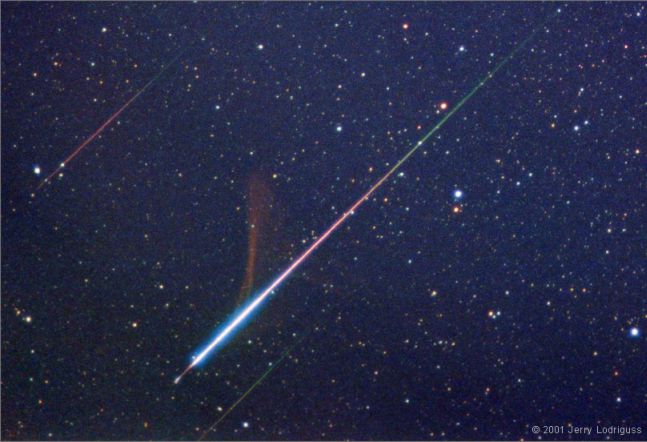
|
Credit & Copyright: Jerry Lodriguss
Explanation:
Returning from orbit,
space shuttles enter the atmosphere at
about 8 kilometers per second as friction heats their protective
ceramic tiles to over 1,400 degrees Celsius.
By contrast, the bits of comet dust which became the
Leonid meteors
seen on November 18, were moving at 70 kilometers per second,
completely vaporizing at altitudes of around 100 kilometers.
In this
single 5 minute time exposure, three Leonid
meteors are
shooting
through skies above Spruce Knob,
West Virginia, USA.
Background stars
are near the constellation Orion.
The brightest meteor, a
fireball, dramatically changes colors along its
path and leaves a smokey
persistant trail drifting
in high-altitude winds.
From that extremely dark site, at an elevation of 1,200 meters,
astrophotographer
Jerry Lodriguss reports, "We observed a
[zenithal
hourly rate] of about 3,600 at 10:30 UT and
very high rates from 9:30 UT until well into the start
of astronomical twilight at 10:50 UT. It was quite a
spectacular storm,
with bolides going off like flashbulbs,
green and red fireballs and other fainter Leonids in all parts of
the sky."
|
January February March April May June July August September October November December |
| ||||||||||||||||||||||||||||||||||||||||||||||||
NASA Web Site Statements, Warnings, and Disclaimers
NASA Official: Jay Norris. Specific rights apply.
A service of: LHEA at NASA / GSFC
& Michigan Tech. U.
Based on Astronomy Picture
Of the Day
Publications with keywords: Leonids 2001 - meteor shower - fireball
Publications with words: Leonids 2001 - meteor shower - fireball
See also:
